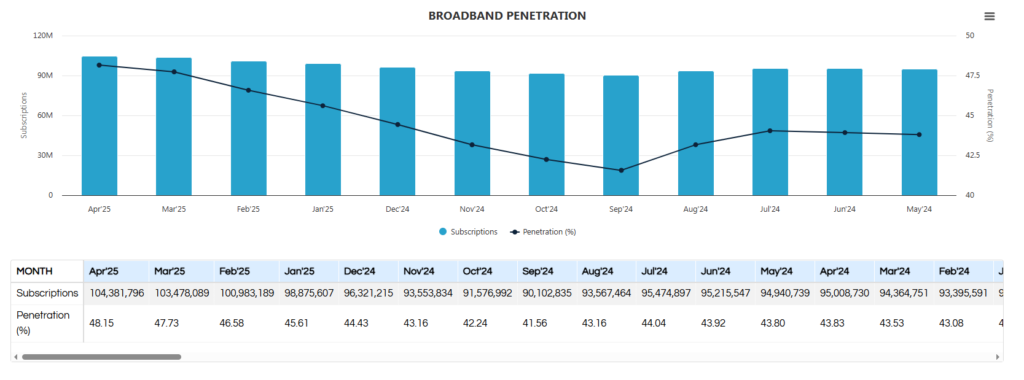The Nigerian Communications Commission (NCC) is opening the gates for a landmark trial aimed at enhancing broadband connectivity in the country by inviting mobile operators and equipment makers to participate in a spectrum sharing experiment within the 1800MHz band.
The telecoms regulator says it is calling on Original Equipment Manufacturers (OEMs) and Mobile Network Operators (MNOs) to express interest in conducting a Proof of Concept (PoC) that will test the coexistence of Long-Term Evolution (LTE) and GSM technologies within the tightly packed frequency bands.
At the heart of the trial is a potentially transformative use of the 20MHz duplex gap (1785–1805MHz) in the 1800MHz band — traditionally allocated for 2G GSM services — to host LTE transmissions. The goal, the NCC says, is to test and validate earlier studies that indicate LTE signals can coexist with existing GSM services without causing harmful interference.

Nigeria accounted for 104,381,796 active broadband subscriptions representing 48.15 per cent nationwide penetration of the high speed internet service as of April 2025, according to NCC’s official market data for the telecoms industry. Basic internet service accounted for 141,985,207 active subscriptions within the same period.
Nigeria accounted for 104,381,796 active broadband subscriptions representing 48.15 per cent nationwide penetration of the high speed internet service as of April 2025, according to NCC’s official market data for the telecoms industry. Basic internet service accounted for 141,985,207 active subscriptions within the same period.
Dr Ikechukwu Adinde, Director of Public Affairs at the NCC, says the trial aligns with the Commission’s commitment to optimise the use of Nigeria’s finite frequency spectrum — a vital national resource — in line with Section 121 of the Nigerian Communications Act, 2003.
“The PoC will be conducted to determine real-world performance and confirm the viability of deploying LTE in the duplex gap without affecting adjacent GSM networks,” he states.
Under the plan, 15MHz of the duplex gap is earmarked for LTE deployment, with protective 2.5MHz guard bands on both ends to shield GSM services from potential disruption.

“The PoC will be conducted to determine real-world performance and confirm the viability of deploying LTE in the duplex gap without affecting adjacent GSM networks,” he states.
1800MHz spectrum trial: Strategic digital push
The Commission underscores that this trial supports its Strategic Vision Plan to provide critical infrastructure for Nigeria’s digital economy — one of the key pillars for national development. With soaring demand for mobile broadband and spectrum-intensive services, the NCC says it has been flooded with requests from industry players seeking access to trial spectrum frequencies to test emerging technologies.
In response, the regulator is offering a non-commercial, three-month PoC licence exclusively to OEMs or MNOs working in tandem with OEMs. However, applicants must adhere to stringent regulatory requirements, including the use of NCC type-approved equipment and payment of applicable spectrum fees.
According to NCC, the trial will be guided by the underlisted rules:
- That Proof of Concept (PoC) trial licence shall only be granted to Original Equipment Manufacturers (OEMs)/Vendors, or Operators in conjunction with their Original Equipment Manufacturers (OEMs)
- That Proof of Concept (PoC) trial shall not exceed a period of three (3) months effective from the date of approval and on a non-commercial basis.
- Equipment for Proof of Concept (PoC) must be “Type-approved’ by the Commission.
- Appropriate spectrum fees must be paid in accordance with the Commission’s Regulations.
The PoC licence is also subject to the Commission’s comprehensive trial conditions, available on its website.
Deadline and Industry Implication Interested parties must submit their Expression of Interest (EOI) by close of business on Wednesday, July 30, 2025, the NCC says.
For Nigeria, according to analysts, the outcome of this trial could be far-reaching. If successful, it could signal the beginning of smarter spectrum reuse strategies, especially as telcos shift from legacy 2G networks to more efficient broadband technologies like 4G and 5G.
By pushing the boundaries of frequency reallocation, the NCC not only joins global regulators in innovating spectrum management but also strengthens the country’s broadband agenda — a key driver for economic growth and digital inclusion in Africa’s most populous nation.
Source of Article
